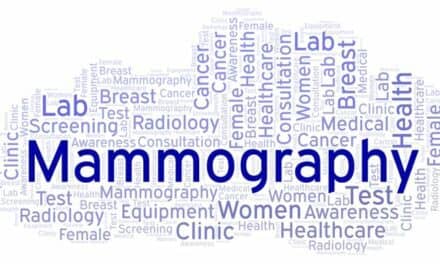The American College of Radiology (ACR), the Breast Cancer Research Foundation (BCRF), and GE HealthCare announce the enrollment of the first patients in the Contrast-Enhanced Mammography Imaging Screening Trial (CMIST). This is a milestone for the clinical trial that will help determine whether contrast-enhanced mammography (CEM) improves breast cancer detection and reduces false-positive exams in women with dense breasts.
Dense breast tissue is a lesser-known risk factor that can double one’s risk for breast cancer and will soon require patient notification in the United States as a result of updates to the U.S. FDA’s Mammography Quality Standards Act (MQSA.
While dense breast tissue is considered common, with about 40% of women aged 40 and older having dense breasts, it can make the detection of breast cancer more challenging. For some patients, tissues can overlap potentially hiding signs of breast cancer; in other cases, the tissue and cancer can show up as white on a mammogram making diagnosis more difficult. As a result, patients often need to seek supplementary screening.
CEM combines mammography and iodinated contrast media in a simple and quick procedure to highlight areas of unusual blood flow patterns that may indicate malignancy. The CMIST study seeks to determine if CEM provides more accurate cancer detection compared to digital breast tomosynthesis (DBT), or 3D mammography, in women with dense breasts. As part of CMIST, a total of 2032 women with dense breasts will be enrolled to compare the CEM technique to 3D mammography.
Carolina Breast Imaging Specialists (CBIS) in Greenville, N.C., is the first of 15 planned sites to start recruiting patients, with additional sites across the United States and Canada commencing recruitment in the coming months. The trial is set to deliver the first results in 2025. The trial is registered on ClinicalTrials.gov under NCT05625659.
“We are very proud and excited to have enrolled the first patients in the multi-center CMIST trial,” says Bruce Schroeder, MD, medical director and CEO of Carolina Breast Imaging Specialists. “Our patients have been eager to participate in this landmark trial both for its potential to find the earliest cancers and for its role in providing much needed data to our global knowledge base. We expect this long-awaited study to show us the value of finally having a highly effective, low-cost examination for women with dense breasts and other challenging circumstances.”
“Dense breast tissue is not only a risk factor, but also makes it increasingly difficult to identify breast cancer,” adds Jyoti Gupta, PhD, president and CEO for Women’s Health and X-ray at GE HealthCare. “The FDA’s recent announcement requiring a single national ‘dense breast’ reporting standard after years of advocacy is a win for patients, as well as providers, in the fight against breast cancer.”
“Providing women with this information offers the potential for early diagnosis and empowers women with dense breasts to make informed and personalized decisions about their breast health through supplemental imaging, like contrast-enhanced mammography,” Gupta says. “I’m excited to see our Senographe Pristina mammography system, SenoBright HD CEM technology and contrast media from our Pharmaceutical Diagnostics segment being used to further evaluate the clinical benefits of CEM as part of our efforts to improve breast cancer outcomes.”






